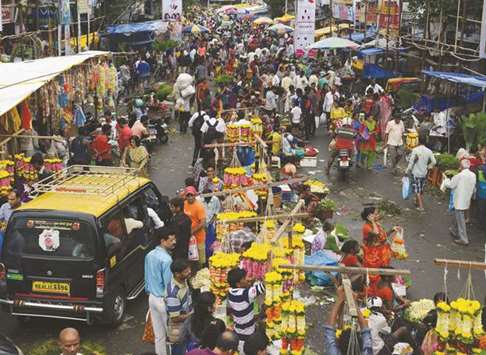The deluge – nearly a month’s average rainfall in a single day – had halted train services and led to flight cancellations.
More heavy rains had been forecast for yesterday, forcing the government to order schools and colleges shut, but in many areas the downpours were lighter.
“The city and suburbs received a few showers in the last few hours but rainfall wasn’t heavy like yesterday,” said K S Hosalikar, a senior India Meterological Department official.
“However in the next few hours Mumbai and adjourning areas are likely to get fairly widespread rainfall, which will be heavy in few pockets.”
Officials said train and air services were operating normally late yesterday in the city, which is home to India’s two biggest stock exchanges and several major companies.
Police said a 45-year-old woman and a 1-1/2-year-old child, members of the same family, died after their home in the northeastern suburb of Vikhroli crumbled on Tuesday, while a 2-year-old girl died in a wall collapse.
In the neighbouring city of Thane, three people died after being swept away by floods, police added.
Some died by falling into open manholes in flooded streets in various suburbs.
Police spokeswoman Rashmi Karandikar said seven other people were missing in Mumbai.
In neighbouring suburbs six people were missing, said a police official, who declined to be named.
Cars were submerged and commuters waded through waist-deep water on Tuesday evening.
“I could not find any mode of transport and spent my night on the streets instead of trying to reach home,” said 62-year-old Gangadin Gupta.
He said many people had been left stranded for much of the night until the rail network reopened early yesterday.
Residents of Dharavi, one of Asia’s biggest slums and home to more than a million people, said much of the low-lying area was under water.
“Most of the shanties and houses in Dharavi were submerged in water and we lost all our valuables,” said Selvam Sathya, 45.
“All of us took refuge on the first floor of different buildings and the water only started receding this morning. I lost all my belongings in the flooding.”
The transport chaos forced the city’s famed dabbawallahs, who take hundreds of thousands of hot lunches from commuters’ homes to offices every day, to cancel their delivery.
Many of the more than 5,000 dabbawallahs were left stranded in the city overnight, a spokesman for the Mumbai Dabbawallha Association said.
The deluge revived memories of 2005 floods that killed more than 500 people, the majority of them in slums where more than half of the city’s 20mn people live.
Unabated construction on floodplains and coastal areas, as well as stormwater drains and waterways clogged by plastic garbage have made the city increasingly vulnerable to storms.
On Tuesday, several firms made arrangements to provide food and rest areas for employees stuck in offices, while officials of temples and religious bodies offered help to those stranded on streets.
“Together, we can overcome any ordeal,” the Mumbai police tweeted.
“Thank you all for showing what humanity is in the face of adversity!”

